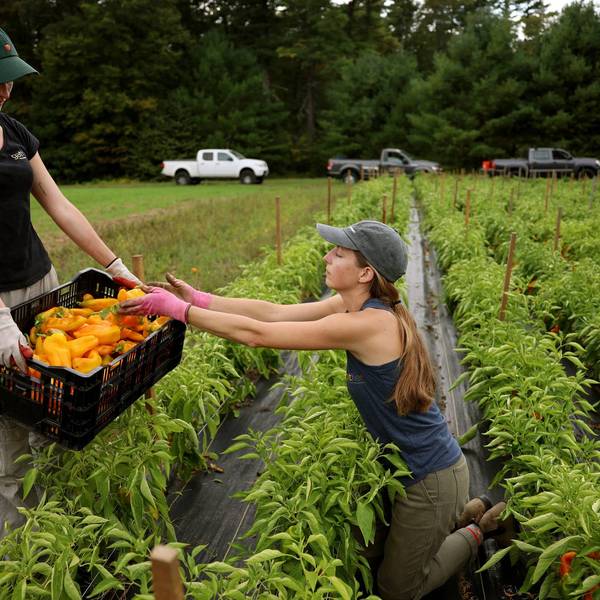The Trump administration's still-fuzzy trade deal with China, announced (as usual) via tweet last Friday, has landed in farm country with a thud. Having endured financial losses and trade uncertainty for nearly two years, farmers have reacted with skepticism and even anger.
Meanwhile, a new poll from the Union of Concerned Scientists and Iowa-based RABA Research shows that voters in five key farm states are worried not just about the impacts of global trade on agriculture and rural communities, but also about a host of other threats, from degraded soil to farm runoff and water pollution to weather disasters driven by climate change. More importantly, these voters indicate that they're looking for new solutions to all these problems--and they can see one such solution in soil.
Voters see agriculture and the future of our food at risk
Before I get to our poll findings, let's review the truly terrible year many farmers have just had. The Midwest, in particular, was hit with months of non-stop spring rains and unprecedented flooding that made working the ground difficult or impossible. According to USDA data, farmers were unable to plant crops on about 19 million acres nationwide, with more than 70 percent of those acres in the Midwest. And while the total damage may not be tallied until early next year, the National Oceanic and Atmospheric Administration reports at least 10 weather and climate disaster events with losses exceeding $1 billion each across the United States in 2019. Meanwhile, ongoing trade disruption meant additional losses for farmers.
A mind-boggling 40 percent of US farm income this year will have come in the form of government assistance, from crop insurance to federal disaster and trade assistance payments. And even with all that help, farm bankruptcies have surged, up 24 percent over 2018.
With that on their minds, here's what 3,000+ voters in five key farm states--Iowa, Michigan, Minnesota, Nebraska, and Arkansas--had to say in our survey:
- Global trade wars and loss of markets are seen as a significant threat. Large majorities in every state--from 72 percent in Arkansas to 84 percent in Minnesota--agreed with this. It's perhaps the least surprising finding, given the amount of ink spilled on the topic over the last two years. Still, it's one that policymakers and political candidates should be aware of, especially if the final China deal doesn't shake out as planned.
- Heartland voters (including farmers) are waking up to the threat of climate change. Overwhelming majorities of voters in each state--as high as 93 percent in Nebraska and Minnesota--say extreme weather is a significant threat to farmers and communities in their area. More interesting, though, is that when asked specifically if "climate change" is affecting local agriculture, majorities in Iowa (58 percent), Michigan (63 percent), Minnesota (65 percent), and Nebraska (59 percent), and a near-majority in Arkansas (49 percent) agreed that it is. Moreover, bucking conventional wisdom, a majority of farmers in our survey also agreed. Putting real numbers on this recently reported trend, 61 percent of respondents with farmers in their households (n=693 across the five states) said climate change is affecting agriculture.
- Large majorities also see other significant threats involving agriculture. These include water pollution caused by pesticides and fertilizers from farms (seen as a significant threat by 74-86 percent of respondents), soil that is damaged or lost to erosion (69-81 percent), and the high cost of farmland (71-84 percent).
- Voters are tired of cleaning up after disasters. Across the five states, respondents seemed weary of doubling down on global commodity production and paying farmers who've suffered financial losses from trade wars, extreme weather, and climate-related disasters. Instead, given the choice, larger numbers of voters (as high as 49 percent in Iowa and Minnesota) reported that they most want to hear political candidates talk about diversifying and developing new markets for the products farmers grow as a way of revitalizing the farm economy. (Perhaps something like this?)
- Even in conservative states, large majorities say government programs offer solutions that help everyone. In numbers ranging from 78 percent in Michigan to 90 percent in Minnesota--also said they support government programs that help farmers try practices that build living soil (which includes applying lots of living and decaying matter to farmland to provide nutrients, hold water, and reduce runoff and pollution). Overwhelming majorities of voters in all five states--as many as 90 percent in Minnesota--agreed that policies and programs that help farmers build healthy, living soil will help everyone, even city dwellers, by keeping water clean, saving taxpayers money on disaster relief, revitalizing local economies, and ensuring a reliable, healthy food supply.
- Voters embrace taxpayer-funded assistance to help farmers protect soil. Majorities in Minnesota, Nebraska, and Arkansas agreed that paying farmers to cover the cost of practices that protect soil, reduce vulnerability to floods and droughts, and prevent water pollution is one of the most important ways to safeguard agriculture and the nation's food supply. Even larger majorities, as large as 71 percent in Minnesota, said the same about offering tax credits or other tax benefits to farmers who adopt such practices.
Note to presidential candidates: Have a plan for soil health!
In perhaps the most interesting result in our survey, large majorities of voters said they would be more likely to support candidates for public office who propose ways to help farmers build healthy, living soil.
QUESTION 14: If a 2020 presidential candidate or other candidate for public office proposed ways to help farmers and rural communities succeed by protecting and building up the soil instead of depleting it, would you be more or less likely to support that candidate?
So, as 2020 presidential candidates crisscross Iowa other farm states this winter looking for messages that resonate with voters , they might want to take a good look at the ground beneath their feet.




